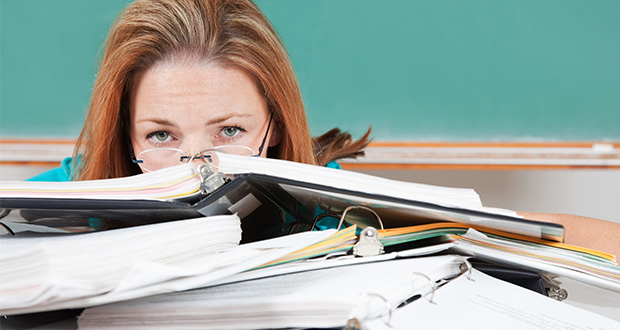An education expert is concerned that the increasing pressures and demands facing Australian teachers is limiting the spaces available for them to speak frankly about their emotions and learn from colleagues and mentors.
Dr Saul Karnovsky spoke to Education Review about this key issue, following his article in The Conversation that underscored how pre-service teachers believed they had to hide or mask negative emotions in order to become a successful teacher.
When asked whether an additional university course on managing stress and emotions could be introduced, or a professional development session for beginning teachers, Karnovsky disagreed.
Instead, the Curtin University expert said we need to “flip the script”’ and not treat this issue as a particular individual’s problem.
“We need to look at the structural conditions that are shaping teachers’ work in the country,” he said.
Karnovsky said the ever-growing “performance and accountability regime”, including high-stakes testing, mandatory curriculum content, strict registration requirements and an ever-growing population of challenging students with a diverse variety of learning needs has “limited the spaces” in the profession to learn about managing a variety of emotions and coping.
“All of this stuff has created ... a dynamic where teachers are squeezed so tight in terms of time and energy, and everyone is so busy and running on their own little treadmills at a million miles an hour, that they don’t have time to stop and talk with another and be collegial,” the Curtin University lecturer said.
He asserts that pre-service and beginning teachers require more time with colleagues and mentors to “talk with each other in an open and honest way”, without fear of judgment. This would allow teachers to open up and discuss feelings of not coping, experiencing challenges with particular students, as well as asking difficult questions.
“This notion of ‘fixing things’...needs to be parked for the time being, and the question needs to be: how do we open up places for teachers to be collegial with one another?” Karnovsky said.
“I can tell you ... that teachers have contacted me from that article saying ‘Thank you for raising this conversation, Saul. We are sick and tired of the self-care strategies of learning how to breathe and do yoga and meditation’.
“It’s just another burden, another thing they have to shoulder.”
The education expert also said that, particularly after the COVID-19 pandemic, “teachers’ ability to cope and bounce back has taken an enormous hit when it was already quite low”.
“Now we’re at this really critical juncture, and I think there are a number of teachers out there who are simply on autopilot, who are in survival mode,” Karnovsky said.
“And what’s going to happen ... is that there is a cliff we’re all moving towards as a society when we think of schools, teachers, our education system. And it’s scary.
“And as someone who is an expert in this area, it scares me.”
The Curtin lecturer emphasised that “band-aid” solutions involving “another module or program”, or “a talking head in a suit with a slick message” were only going to make the current situation worse, not better. Karnovsky said such “solutions” would only make teachers feel as if they were not listened to, which is already a strong sentiment.
He also discussed the importance of “creative autonomy”, describing this as “possible options” available to teachers in response to student behaviour, learning, interests and communities.
“With any standardisation process, we narrow the field of possible ways of doing the work of teaching and education,” he said.
“There often was ... good intent for some of this policy making, but it’s only when the stuff is implemented, and it’s rolled out, and it becomes standard practice that we see the consequences."
Through this ongoing “standardisation process”, Karnovsky asserts that the Australian education system is heading in the opposite direction of the Finnish one, often lauded as one of the best in the world.
Teachers in Finland are afforded “enormous creative autonomy”, the education expert said.
“Policymakers [in Finland] trust the teachers, and the principals and people who work in schools immensely.”
“[They] say: ‘Hey, you know your business, so we are going to give you that creative autonomy to decide what’s going to work best here.’
“And that has resulted in this unique and quite wonderful new way of thinking about how we educate our population.”
Do you have an idea for a story?Email [email protected]
 Education Review The latest in education news
Education Review The latest in education news
